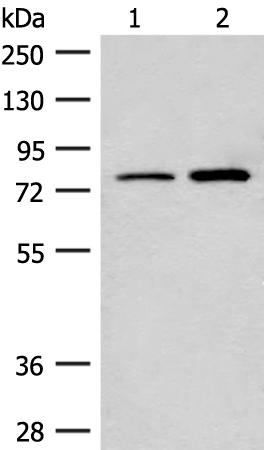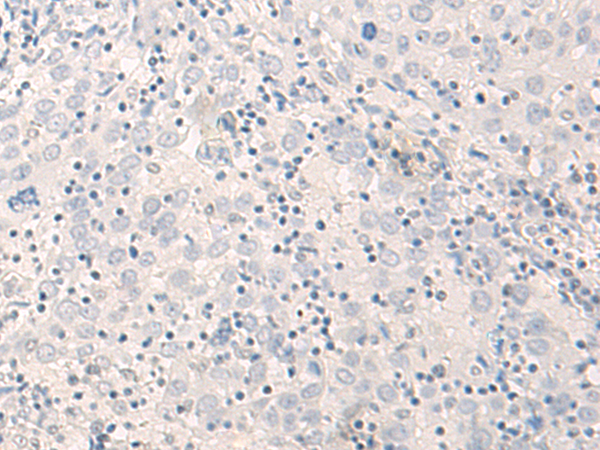

| WB | 咨询技术 | Human,Mouse,Rat |
| IF | 咨询技术 | Human,Mouse,Rat |
| IHC | 1/25-1/100 | Human,Mouse,Rat |
| ICC | 技术咨询 | Human,Mouse,Rat |
| FCM | 咨询技术 | Human,Mouse,Rat |
| Elisa | 1/2000-1/5000 | Human,Mouse,Rat |
| Aliases | TOP; MP78; EP24.15; MEPD_HUMAN |
| WB Predicted band size | 79 kDa |
| Host/Isotype | Rabbit IgG |
| Antibody Type | Primary antibody |
| Storage | Store at 4°C short term. Aliquot and store at -20°C long term. Avoid freeze/thaw cycles. |
| Species Reactivity | Human, Mouse, Rat |
| Immunogen | Fusion protein of human THOP1 |
| Formulation | Purified antibody in PBS with 0.05% sodium azide and 50% glycerol. |
+ +
以下是3篇与THOP1抗体相关的文献示例(内容基于公开研究概括,具体文献请核实数据库):
1. **文献名称**: "Thimet oligopeptidase (THOP1) regulates antigen processing and presentation in dendritic cells"
**作者**: Thompson, A. et al.
**摘要**: 本研究利用THOP1特异性抗体,证实THOP1通过降解特定肽段参与树突状细胞的抗原呈递过程,影响T细胞免疫应答。
2. **文献名称**: "Characterization of a monoclonal antibody against THOP1 for neurodegenerative disease research"
**作者**: Santos, R. et al.
**摘要**: 开发并验证了一种高特异性THOP1单克隆抗体,应用于阿尔茨海默病模型小鼠脑组织分析,发现THOP1表达与β-淀粉样蛋白代谢相关。
3. **文献名称**: "THOP1 modulates mitochondrial function and oxidative stress in cancer cells: Evidence from antibody-based inhibition assays"
**作者**: Chen, L. & Wang, H.
**摘要**: 通过抗体阻断实验,揭示THOP1通过调控线粒体肽段水解影响肿瘤细胞的氧化应激耐受性,为癌症治疗提供潜在靶点。
如需具体文献DOI或全文,建议在PubMed或Web of Science中检索关键词“THOP1 antibody” + 应用方向(如“immunoassay”“disease model”等)。
The THOP1 (Thimet Oligopeptidase 1) antibody is a tool used to detect and study the THOP1 protein, a zinc-dependent metalloprotease belonging to the M3 peptidase family. THOP1. also known as endopeptidase 24.15. is involved in peptide metabolism, particularly in cleaving small bioactive peptides (e.g., neuropeptides, hormones) within cells. It localizes to the cytoplasm and nucleus, playing roles in regulating peptide signaling, antigen presentation, and protein degradation pathways. Dysregulation of THOP1 has been linked to neurological disorders, cancer, and immune dysfunction.
The antibody enables researchers to investigate THOP1's expression patterns, subcellular localization, and interactions via techniques like Western blotting, immunohistochemistry, and immunofluorescence. It is critical for elucidating THOP1's physiological functions, such as its proposed involvement in Alzheimer’s disease via amyloid-beta peptide processing, or its dual role in cancer progression as both a tumor suppressor and promoter. Commercial THOP1 antibodies are typically raised against specific epitopes (e.g., human THOP1 amino acid sequences) and validated for cross-reactivity in model organisms. Ongoing research focuses on its therapeutic potential as a drug target or biomarker.
×